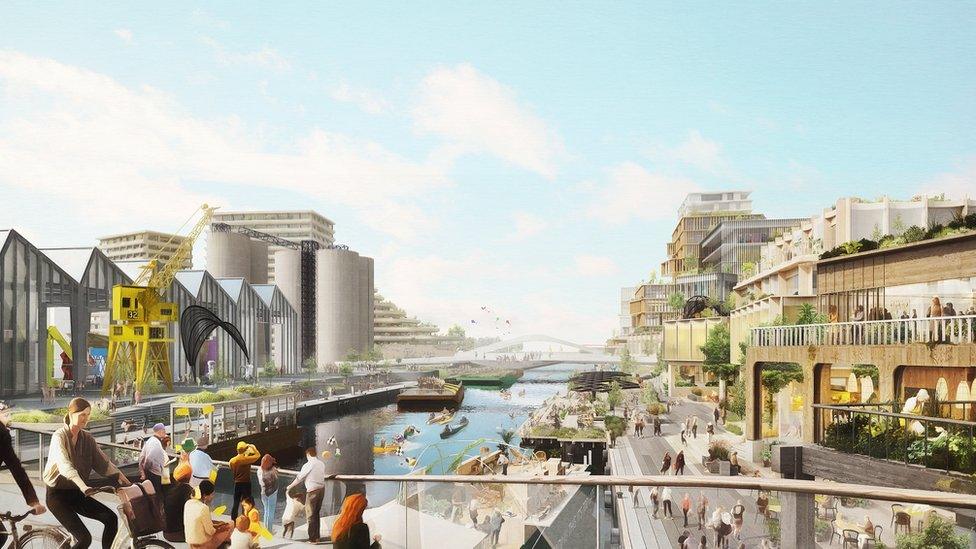Google given green light for Toronto smart city
- Published

Google wants to create a high-tech neighbourhood with eco-friendly buildings, robots and sensors collecting a range of data
Sidewalk Labs's plans to create a smart city in a disused area of Toronto can proceed but on a much smaller scale than it had wanted.
Any data the Google-affiliate collects there must be treated as a public asset.
Waterfront Toronto, the group charged with overseeing development of the area, voted unanimously for it to proceed, after imposing several conditions.
The project has proved controversial.
Sidewalk Labs had wanted to develop a 190-acre (0.7-sq-km) site but was given permission for just 12 acres. It had also wanted to create its own group to oversee the data collected by sensors around the city, which was also rejected.
The project will now move forward to a more formal evaluation and further public consultations. A final vote on whether to approve the project is set for March 2020.
Sidewalk Labs said: "We are encouraged by today's decision by the Waterfront Toronto board and are pleased to have reached alignment on critical issues with Waterfront Toronto.
"We are working to demonstrate an inclusive neighbourhood here in Toronto, where we can shorten commute times, make housing more affordable, create new jobs, and set a new standard for a healthier planet."
Stephen Diamond, who chairs the Waterfront Toronto group, said in an open letter: "Let me be clear, this is not a done deal. There is still much work to do before a final decision.
"While a final board decision whether or not to proceed has yet to be made, we are pleased that we are now able to move to the evaluation stage on a project that has the potential to create new jobs and economic development opportunities, create a carbon-neutral neighbourhood and more affordable housing units."
Tech's sake
Sidewalk Labs won an initial contract to develop the area in 2017 and promised a radical mix of offices, retail spaces and homes, with high-tech solutions to urban problems such as traffic and waste disposal.
But there were questions about how transparent the deal with Waterfront Toronto was.
It later emerged its ambitions went beyond the initial 12-acre site, with a much bigger neighbourhood earmarked for development.
In return for its investment in the area, it wanted a share of property taxes, development fees and to benefit from the increased value of the land.
Sidewalk Labs released its blueprints for developing the site in June and an expert panel appointed by Waterfront Toronto to assess it produced a report criticising some of its proposals, calling them "tech for tech's sake".
Meanwhile, Block Sidewalk, a citizen opposition group, was set up calling for the project to be dropped entirely. It questioned why a technology company was allowed to be involved in city governance at all and said citizens had not been properly consulted about what they wanted to see developed in the area.
Experts remain divided on the plans. In an article in Toronto Life, ahead of the decision, while the involvement of Sidewalk Labs could see a new generation of start-up companies propel Toronto into the top ranks of global cities.
- Published18 May 2019
- Published12 September 2019